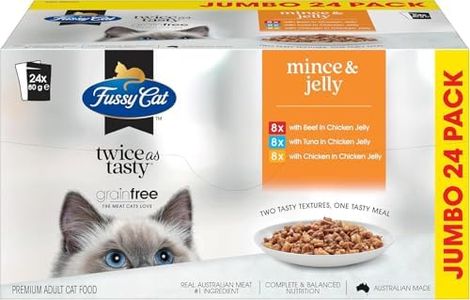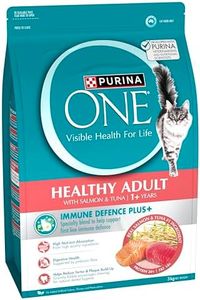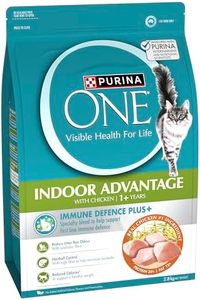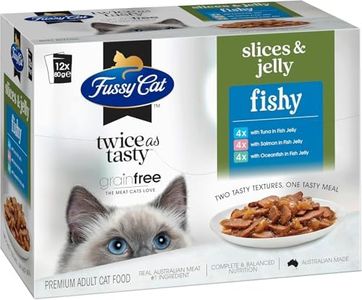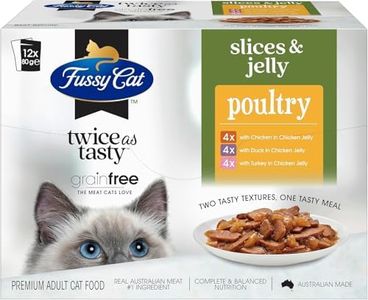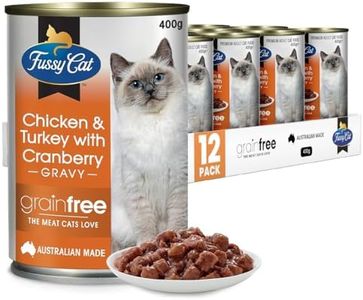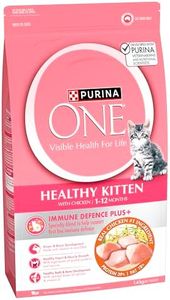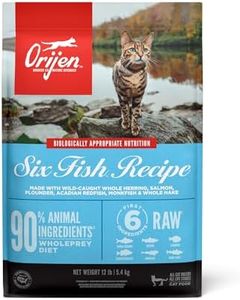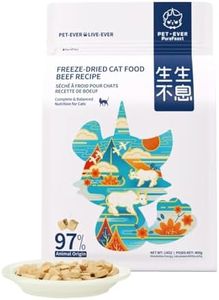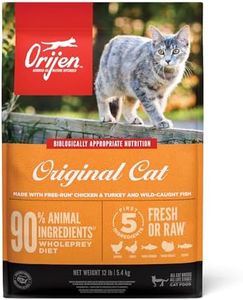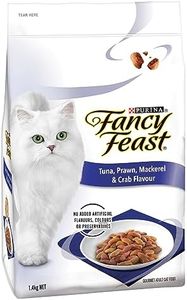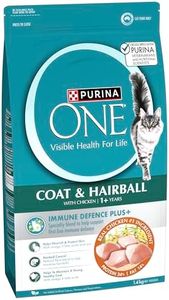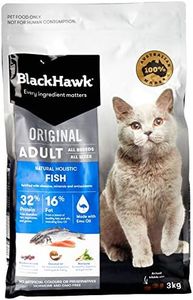We Use CookiesWe use cookies to enhance the security, performance,
functionality and for analytical and promotional activities. By continuing to browse this site you
are agreeing to our privacy policy
10 Best High Protein Cat Foods
From leading brands and best sellers available on the web.By clicking on a link to a third party's website, log data is shared with that third party.
Buying Guide for the Best High Protein Cat Foods
Choosing the right high-protein cat food is essential for your cat's health and wellbeing. Protein is a vital nutrient for cats, as they are obligate carnivores, which means they require a diet that is rich in quality animal protein to thrive. When shopping for high-protein cat food, it’s important not only to look at the protein content but also to consider the type, source, and overall nutritional balance. To find the best fit for your cat, consider their age, activity level, health status, and personal preferences. Reading the ingredient list and understanding the product label will help you make an informed choice tailored to your pet’s unique needs.Protein ContentProtein content refers to the percentage of protein in the cat food and is usually listed on the nutrition label. This is important because cats need protein for muscle maintenance, energy, and overall health. Generally, protein percentages can be divided into lower (below 30%), moderate (30-40%), and high (above 40%) ranges for dry food; wet foods often have slightly different scales but follow similar patterns. For most healthy adult cats, foods with 30% or higher protein are suitable, but active, young, or underweight cats may benefit from even higher protein levels. Senior cats or those with certain health conditions may require different amounts, so always consider your cat’s age and any advice from your veterinarian when deciding.
Protein SourceThe source of protein—whether it comes from named meats (like chicken, salmon, or turkey), meat meals, or plant-based ingredients—greatly affects the quality of the food. Animal-based proteins provide the amino acids cats need, while too much plant protein can be less digestible. Foods listing real meats or named meals as the primary ingredients are generally better choices. If your cat has allergies or sensitivities, you may need to try novel proteins such as duck or rabbit. Always read the first few ingredients to ensure quality and appropriateness for your cat's needs.
AAFCO Nutritional AdequacyThis refers to whether the food meets the nutritional standards set by the Association of American Feed Control Officials (AAFCO). This is important because it ensures the food provides complete and balanced nutrition for your cat. Labels typically state if the product is formulated for a specific life stage (kitten, adult, or all life stages) according to AAFCO guidelines. Choose a food that is properly labeled for your cat’s age and lifestyle to ensure their dietary requirements are being met.
Carbohydrate LevelsSince cats have little need for carbohydrates, high-protein foods should also have relatively low carbohydrate content. Carbohydrates often come from grains or starches, which some cats may not tolerate well. Foods with lower carbs support better weight management and digestive health, especially for active or overweight cats. If your cat is prone to obesity or has digestive issues, seek high-protein cat foods with limited grains or fillers.
Moisture ContentMoisture content describes how much water is in the food, affecting overall hydration and nutrient density. Wet (canned) food has higher moisture, which can help cats who do not drink enough water, while dry food is more concentrated and may last longer once opened. The choice between wet and dry often depends on your cat’s preference, hydration needs, and lifestyle, so consider your cat’s water intake habits and any advice from your veterinarian.
Special Diets and AdditivesSome high-protein cat foods include additional supplements like omega fatty acids, probiotics, or specific vitamins and minerals to target health issues such as hairballs, urinary health, or skin and coat support. These can be beneficial if your cat has specific health concerns, but unnecessary additives may not always be needed for healthy cats. Consider these extras if your vet recommends them or if your cat shows signs of needing extra nutritional support.
